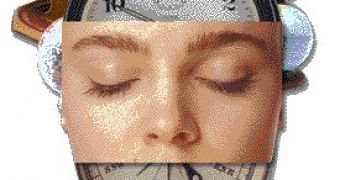When we do what we do is scheduled by our circadian clocks.
The inner clock is guided by the perception of light-dark periods and people who travel through several time zones experience jet lag (time-change fatigue).
Now a mix team from Cornell and Dartmouth reveals the molecular mechanism behind the circadian clocks, triggered by chemical changes induced by the light energy. The cells' circadian clocks are sensitive to light level differences between night and day, permitting the organisms to forecast environmental changes, according to which they regulate their metabolism.
The clocks operate in extremely various processes: blooming time in plants that open their petals at precise times (night, evening, morning or midday); spores' release by fungi, to optimize their spreading.
In humans, the clocks determine when we eat, sleep or stay active but also control most inner functions. In humans, disrupting the circadian rhythms provokes jet lag, mental illness and even some cancers. "These clocks are highly conserved in all organisms, and in organisms separated by hundreds of millions of years of evolution," said senior author Brian Crane, an associate professor in Cornell's Department of Chemistry and Chemical Biology.
The investigated species, a fungus named Neurospora crassa employs the circadian clock light sensors to control carotenoids synthesis. These chemicals protect the cells against damage from the sun's ultraviolet radiation during daylight. A protein named vivid contains a chromophore (light-absorbing molecule) which under the photons' action suffers surface structural changes.
These changes lead to the expression of genes that control carotenoid synthesis. By changing just one atom (sulfur for oxygen) on the surface of the vivid protein, the team disabled its power of triggering carotenoid synthesis. "We can now show that this conformational change in the protein is directly related to its function in the organism," said lead author Brian Zoltowski, a graduate student at Cornell in chemical biology.
A similar protein could induce sleeping time in humans. "We were interested in trying to understand behavior at the molecular level. This a great example of chemical biology, in that we can perturb the chemistry of a single molecule in a particular way and actually change the behavior of a complex organism", Crane said.

 14 DAY TRIAL //
14 DAY TRIAL //